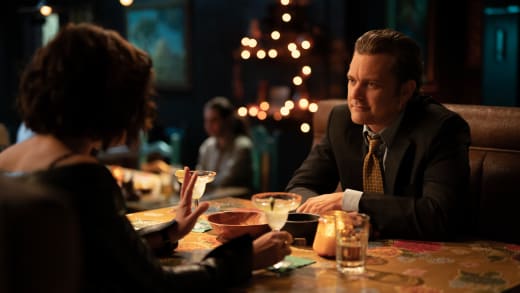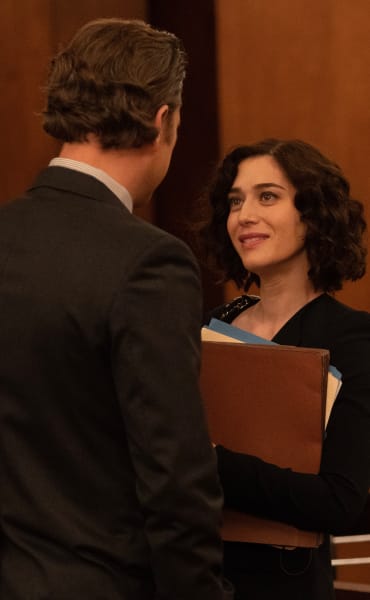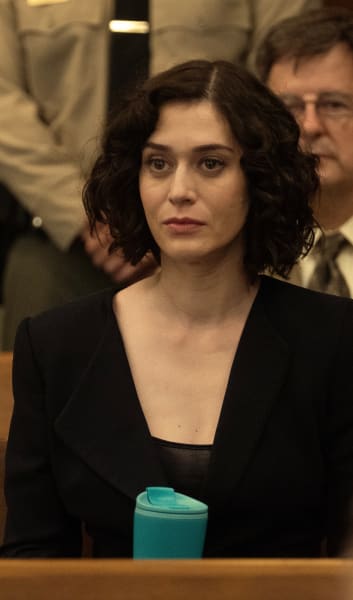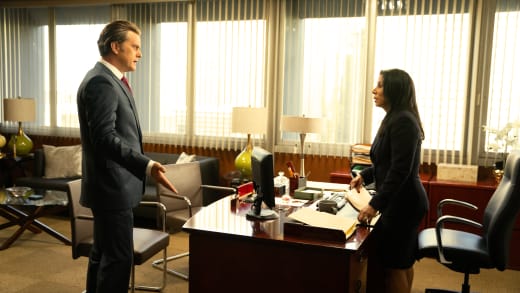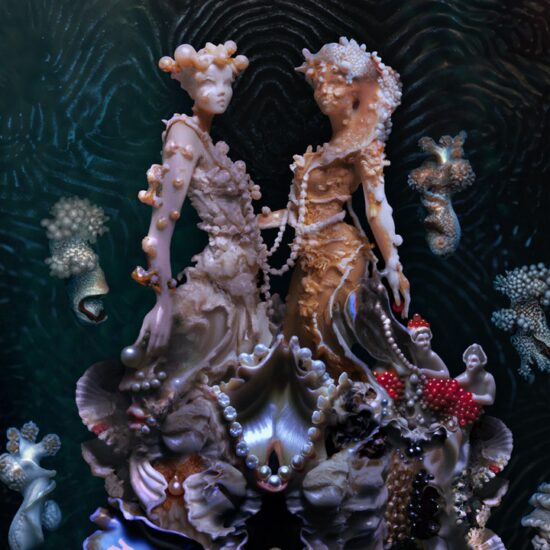
Is it possible to elevate and modernize a cult classic film?
Fatal Attraction attempts to do just that, taking an iconic ’80s thriller and giving it more depth and nuance, expanding on a universe we’re familiar with, grounding it, and bringing it close to home.
The slow burn quality of Fatal Attraction Season 1 Episode 1 folds into the groundwork laid in Fatal Attraction Season 1 Episode 2. Then it does something entirely unexpected and necessary when we finally get what the movie lacked in Fatal Attraction Season 1 Episode 3, Alex’s perspective.
In doing so, in its first three installments, this series reshapes the narrative in a refreshing way that stands the test of time, melding a family drama with a psychological thriller and a murder mystery in one.
The series attempts to exchange fun caricatures for evocative characters, borrowing from the film while still setting itself apart from it, knowing the natural inclination for comparison and still angling for its own identity despite that.
One thing assured here is that the cast puts in the work to elevate this material; Joshua Jackson always delivers, balancing a confident but conflicted Dan in the past with the desperate, humbled man of the present.
And there are moments when his version of Dan almost certainly invites some The Affair comparisons; in fact, much of the series has that overall feel, even without Jackson’s talent for always finding that medium between sympathetic and schmuck.
Lizzy Caplan does a great job of bringing subtlety and softness to Alex Forrester, making her far more sympathetic and coinciding with the series’ attempt to add some balance and explore her mental illness with some care, albeit imperfectly.
Amanda Peet manages to portray Beth well in that she’s not solely some one-dimensional wife, especially when they explore her feelings in the present, and Alyssa Jirrels has a difficult task of exploring a character perspective with limited material to pull from, expanding on the long-term consequences from the fatal affair.
But truthfully, the scene stealer of the bunch thus far is Toby Huss’ Mike, who neither pulls any punches with Dan while also being the loyal confidant he needs in both the past and the present.
It’s ambitious of this series to juggle two timelines as it does, and there are moments when it can be a bit difficult to roll with the constant back and forth, although it’s fairly easy to keep up with, thanks mainly to adult Ellen’s presence and Dan’s hair.
Bad decisions lead to bad outcomes, you play stupid games, you win stupid prizes.
Dan
Jackson is so good in that he carries himself differently from timeline to timeline, with things as subtly as that dejected, hesitant way Dan walks after 15 years in prison to the small moments he takes, like turning his face up to the sun at a coffee shop or marveling at the smell of Jasmine.
The separate timelines are crucial to expanding on the story as we explore the far-reaching effects of this affair, and it also takes what could solely be a family drama and thriller and transforms it into a murder mystery that could very well grow legs as the season progresses.
With this move, Fatal Attraction may not be everyone’s cup of tea. If you went into this series expecting a full-blown thriller, an erotic one at that, it could be a letdown to discover that we get more of a psychological slow burn and a murder mystery with a dash of procedural.
In fact, in an age where eroticism and exploration of the female gaze is a hot topic, especially with the likes of Bridgerton and other such things, it is a bit disappointing that they didn’t take bigger swings with the sexual component of the series.
Dan and Alex’s initial hookup brought some steam, mainly because we got an enticing build-up. For the most part, the sex felt perfunctory for the story of how an affair went so horribly wrong and changed everyone’s lives, presumably resulting in Alex’s death and utterly destroying Dan’s world.
When we first meet him, he’s at a parole board, contritely expressing accountability for the murder of Alex 15 years prior. It’s a convincing enough performance that it feels real until he’s out and insisting on his innocence, determined to clear his name and pick up the pieces of a life he had forgone over a decade before.
His first order of business is trying to reconnect with Ellen, and here’s where you find real sympathy for Dan. Because interestingly enough, the series highlights that both Dan and Alex are at fault for their many actions but are still sympathetic individuals.
Dan: You should know that it’s okay to say no.
Ellen: To what?
Dan: I don’t know yet but first I have to tell you something. I need to say it to your face even if you don’t believe me. I did not kill that woman. Alex Forrest.
Ellen: Yes you did.
Dan: No, no I didn’t.
Ellen: No, you said you did. You lost control in a rage, and she didn’t matter, so then you took her life.
Dan: You were there?
Ellen: You asked me to come.
We’re not entirely sure that Dan killed Alex; he’s convincing enough, and knowing that he could be innocent at all makes him facing such extreme ramifications for an affair in the form of nearly 20 years in prison feel so extreme and unfair that it compels you to sympathize with a character who essentially exuded all the privilege.
Here’s where the modern retelling of this can be interesting, and the series is leaning into that a bit, sometimes heavy-handed, but still.
Dan, on paper, is the height of privilege as a straight, economically comfortable white man and straight-up nepo-baby with a seemingly perfect life. He’s the guy we are compelled to resent or be wary of as the world tends to bend to a person like Dan’s will.
It proved true in the original film when a less likable version of Dan, expertly played by Michael Douglas, indulged in an affair only to emerge as a victim with very little culpability and return to his happy life virtually untouched.
Here, there’s enough nuance with Dan to actually make him a character you root for, as we see that even with all of his respective privileges, he’s not infallible.
You know, if you were a different guy I’d be telling you to be careful right now but you’re not a different guy, are you?
Mike
We get Dan as a near-textbook “Nice Guy” who presents as someone that’s so morally sound that the mere fact that he’d engage in an affair is borderline laughable to people.
Knowing that he’s gone from the virtual Golden Boy to a convicted felon in this shocking fall from grace makes for a compelling story through a character introduced as a Gary Stu, if only to quickly subvert it.
It was interesting to see Dan as this stickler for the rules prosecutor who was tough on crime with what appeared to be a clear moral code, only to have that shift when it was most convenient for him. We saw that when he had no sympathy for a drunk driver, then proceeded to commit the act himself and cover it up.
And he seemed to disapprove of Frank’s promiscuity and infidelity, only to jump into bed with Alex without much prompting and little guilt.
Beth: So what happens now?
Dan: Nothing.
Beth: But you crashed a company car drunk.
Dan: Well, we know that, and Mike knows that, but they don’t know that.
He’s a hypocrite, in that way that we all are. People are complicated, and the series manages to present that, not thus far veering either Dan or Alex into territory where they’re far too unlikeable to stand.
Their affair stemmed from Dan facing a rough moment. It was unintentionally amusing that Dan was a sure thing for an appointment to judge at 40 as a good lawyer, sure, but also as the son of a legendary judge lamenting that he got screwed out of the gig because of, well, more nepotism.
It’s a level of awareness that’s subtle enough to entertain and provide the commentary that the series is unabashedly trying to make. It’s received much better than the more overt and pretentious attempts at introducing analyses like the near-constant droning on about Jung and psychological theories that mirror what we were seeing.
Dan clearly lived in his father’s shadow, feeling inadequate while also dealing with the judgment and similar inadequacy projected onto him by his father-in-law.
Fuck them for not knowing your value, fuck their whole asses.
Beth
It didn’t seem to matter how supportive and loving Beth was, Alex was the perfect distraction, and she was someone with her on set of Daddy issues that she expressed during some of their talks.
It was easy to see how they fell into an affair, more so for Alex than Dan. Dan represents a sad reality that sometimes people don’t need an elaborate or tragic reason for their actions. There is some comfort in knowing there’s nothing to justify his affair.
For Alex, it was evident that she was all alone in a new city, and she longed for connection and love. The third installment does the best job of illustrating that. Not only do we get the complexities of her mental illness that add some layers to her, but she elicits sympathy and relatability in a way that adds context to her character.
It’s the type of background that we don’t get in the film, and it keeps her from being a one-dimensional villain.
For Alex, she radiates someone who needs to be loved, and she does whatever she needs to do to get it, but the problem is that she gets so carried away that she scares people off, which is rather tragic when you consider it.
Interestingly, food is a significant factor in her connecting with people, her love language being gift-giving (does a fake witness ID count as a gift?) as she tries to bribe, for lack of a more apt word, people into loving her or being her friend.
Worse yet, she’d lose herself in their interest, too, attempting to mold herself around what they like in hopes that she’d fare better. It was all the same whether it was some fancy sub or meatballs.
And the thing was, she was just lonely enough that she’d settle for having a friend. It killed her when the bailiff, she must’ve had something going on with it, even if it was just one-sided on her part, tossed out her fritter, or gave it away to someone else.
Alex: Can’t get out of here fast enough. Three minutes after you’ve come, you’re already dressed.
Dan: No.
Alex: You’re not already dressed?
Dan: It’s late.
Alex: It’s early.
Dan: Did I do something?
Alex: Not yet, not if you take all of that off and fuck me again.
Dan: I can’t.
Alex: you better hurry; it’s not the walk of shame if nobody sees you.
It sounded like she got carried away with their interactions, and he put up a boundary that left her feeling rejected yet again. And the entire situation with Paul showcased how she can get carried away, too.
He must’ve been the Dan before Dan. She clung to the sandwich that Paul seemed to love, gifting it to him like some olive branch and extension of friendship even after she threatened him.
She seemed appalled and angry when Paul left in the middle of the night, not understanding how her actions drove him away, and he became what amounted to another person in a long list of them who she pushes away because of who she is.
And that’s sad; it’s something that instinctively, as humans, we can sympathize with, this fear of rejection and loneliness, not being seen or understood.
Alex’s conversation with her therapist was particularly illuminating as she even attempted to rope this professional into being her friend in place of finding new help in California.
Based on the exasperated and disapproving way that her therapist spoke to her, something that Alex openly admitted she couldn’t figure out, she’s even exhausted a professional.
It helped us understand how alienated Alex is, why she goes as hard as she does the second she feels she clicks with someone, and why her behavior ultimately pushes anyone close enough to her away.
It’s the ugly reality many people face, whether it’s mental illness, neurodivergence, or just unusual personalities and quirks. It’s one that dances on the line between uncomfortable truth and stigmatization.
Hi, it’s me. Again. They have this new special this ravioli cheese with roasted tomatoes. You know, for me to order not meatballs, it must be pretty good. I don’t know how long it’ll be on the menu, so this is your heads-up because I haven’t seen you in a while. It’s starting to make me feel like I misunderstood something, except I really don’t think that I did. I think you might have, though, and so I want to help. I want to help you be the man that I know that you are for your sake and everybody else’s but in order to do that, I can’t let you pretend that I don’t exist because I do exist, and I’m not going to be ignored, Dan.
Alex
Alex’s more profound connections were with the clients, as her being a victim advocate belies that she herself has some experience in that realm. Her initial attraction to Dan was confirmed by how he spoke to the victim’s family in a way that spoke to an inner yearning she’s had all the time that’s gone unfulfilled.
It’s all of these layers for Alex that answer the question as to why someone would want to reboot the film, and through those moments, it makes you wish that the series stuck with Alex and her perspective a bit more.
But we do have some indicators about how things play out for her. We know that Dan has been imprisoned for her murder and insists he didn’t kill her.
And we’ve had indicators along the way that he’s innocent, and this could very well be an elaborate ruse or some payback on Alex’s part.
One of the first cases the two discuss has to do with Dan charging someone for the death of a person whose body he hasn’t found. And he’s brought up that a prosecutor’s worst fear could be the presumed dead person appearing in court.
It feels like the foreshadowing this series would opt for. We also know Alex is incredibly manipulative and cunning, which could only grow more extreme the more hurt she feels and the more vengeful.
Lonely or not, it was disturbing to see how she manipulated and orchestrated situations so she could be with Dan, setting a fire in the bathroom, following him, using information she overheard to connect with him, all of that.
She flipped like a switch on Paul, scaring him enough to leave in the middle of the night. And the second Dan rolled out of her bed, she faked a suicide attempt for his attention, one he saw right through.
She’s not above hurting herself either, as we saw that she self-harms. The ultimate payback for Alex could’ve been making Dan go to prison for her death.
By the end of the third installment, she had shown up at his house, spoke to his wife before him, and threw acid on his car.
And the sad thing is, as awful as her actions are, we saw why she would’ve gotten to that point. Alex gave Dan the opportunity for a clean break after the suicide attempt manipulation when she showed up at his office and said she’d at least want to be friends.
And she seemed to understand why he’d refuse that. Dan pulling her into a hug when she attempted a handshake was an odd choice with someone who clearly was fragile and wanted more.
It’s the type of mixed message that would set her on edge. And Dan isn’t a stupid man. It muddies the waters, making this grey area one where both characters still share the blame, providing some balance to the situation in a way that the film flat-out lacked.
While we’re still headed in the same direction of the rare but not improbable mentally ill woman stalking and harassing this man, it’s still a worthwhile attempt that coincides with more modern conscientious storytelling.
Dan in the present is interesting because it will take a lot for him to navigate his new world, reconnect with his family, and prove his innocence.
So far, all he really has is Mike to lean on, and it seems Mike has always respected his friend’s innocence and at least has a firm grasp on where Dan is flawed.
Dan: So Arthur would keep looking?
Ellen: Yeah, Arthur would definitely keep looking.
Dan: You get along with him? I mean, I don’t know why you wouldn’t, you always did. What do you call him?
Dan’s relationship with Ellen is interesting because he has a lot of ground to cover and things to make up for, and it’s his own doing.
We learn that he pushed Beth and Ellen away when he went to prison and claimed he couldn’t hold a space for them in his life while trying to survive prison, which resulted in him cutting ties with them altogether.
And it was such a dumb and selfish move that he clearly regrets and has not resorted to blaming Beth for because it’s easier than accepting how he hurt himself and his daughter in the process.
Ellen has spent the better part of 15 years feeling that her father wanted nothing to do with her (though he loved her) while also dealing with the ramifications of her father’s supposed actions and reputation.
It’s no surprise that she’s deeply into psychology. And, once she gets onboard, she could be a useful asset in helping her father clear his name.
We saw how close they were in the past, she was a Daddy’s Girl, and even in therapy, she expresses that she wants to be in a place where she can just hold her father’s hand again, experience that feeling she did when she was a child, and her father was seemingly her world and the person who understood her most.
Ellen, and her neurodivergent presentation, struggling to bond with her father with her mixed feelings, is part of what makes the present so interesting, even if it is an unexpected story to explore.
The scenes with her and her father are more compelling than some of her therapy sessions or the bits of her listening to notes because they feel organic and less like Ellen serving as the audience surrogate or perhaps third-person narrator.
She’s attempting to find a place for the man who used to be her world, but everything is so different. One of the minor annoyances is knowing that she now calls family friend turned stepdad “Dad.”
Ellen was old enough to have a solid grasp of Dan as her father without the desire to call someone else, especially someone who was likely an “uncle” to her at some point, “dad.”
It felt like a needless dagger to Dan’s heart, kicking him while he was already down, broadening the chasm between him and Ellen, and making him feel further displaced.
But Arthur, despite that, seems to be objective when it comes to Dan genuinely, and he has some excellent advice for both women when he brings up Dan’s perspective on why he would push them away many years ago but also blamed them for not fighting harder to be in his life.
All of that could make for an interesting dynamic, and I look forward to Dan and Arthur’s interactions in the present.
Over to you, Fatal Attraction Fanatics. Is this a worthwhile reboot? Do you like the different timelines? Do you think Dan really killed Alex? Hit the comments.
Fatal Attraction airs Sundays on Paramount+. Also, check our exclusive interview with the Fatal Attraction cast.
Jasmine Blu is a senior staff writer for TV Fanatic. She is an insomniac who spends late nights and early mornings binge-watching way too many shows and binge-drinking way too much tea. Her eclectic taste makes her an unpredictable viewer with an appreciation for complex characters, diverse representation, dynamic duos, compelling stories, and guilty pleasures. You’ll definitely find her obsessively live-tweeting, waxing poetic, and chatting up fellow Fanatics and readers. Follow her on Twitter.













